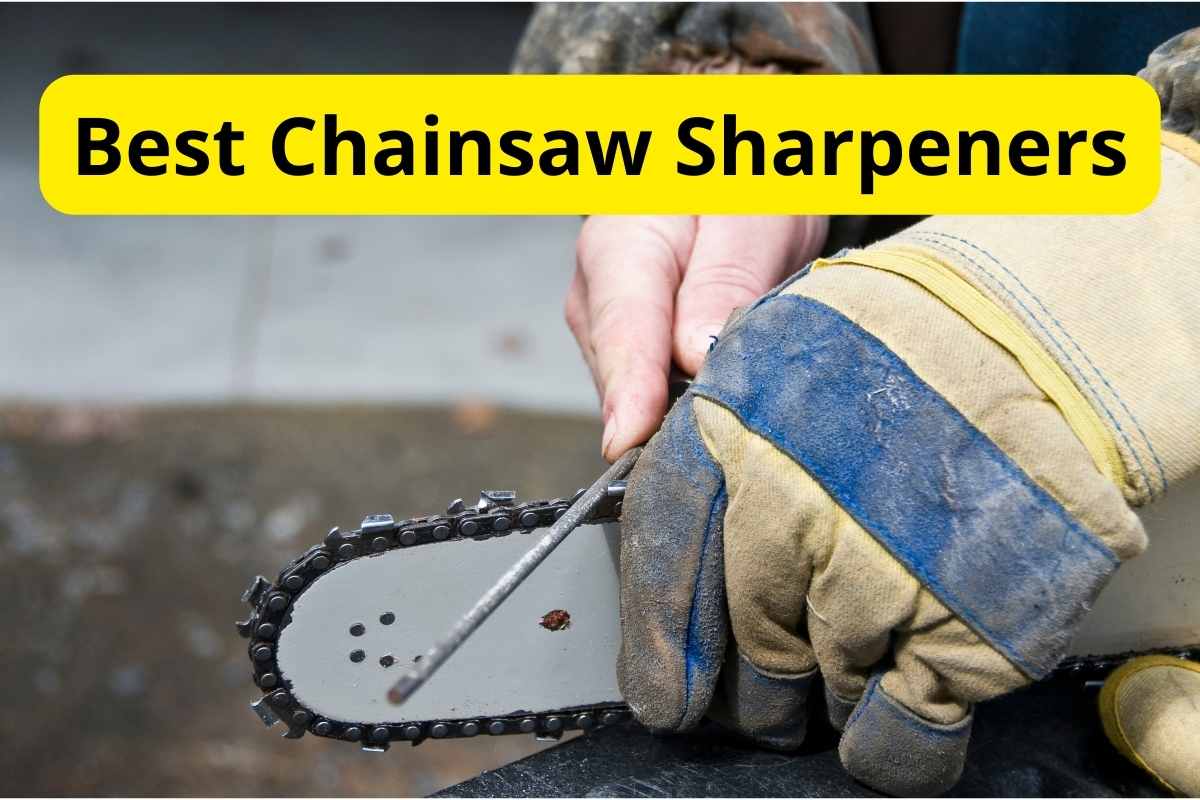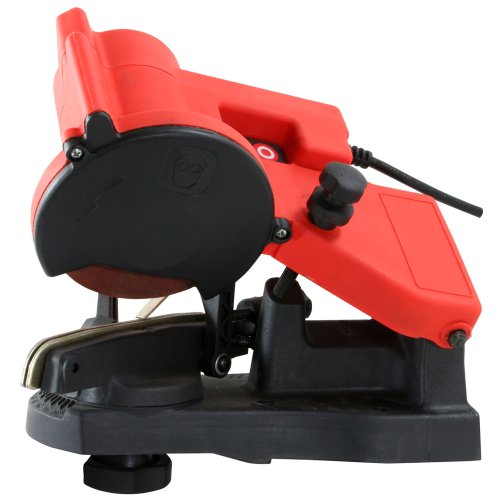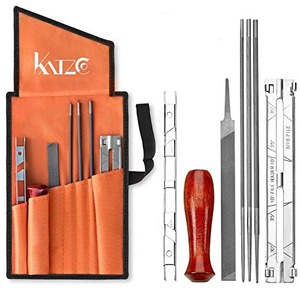
Tired of buying a new chain every time your chainsaw blades get dull? Why not try a chainsaw sharpener? They can quickly and easily restore your chainsaw’s cutting edge while saving you time and money.
Chainsaw sharpeners have come a long way since the old days of chainsaw files. Today, you can choose from hand-powered or electric, bar-mounted or wall-mounted, and manual or hydraulic assist. The options are endless.
To help you narrow the field and choose the best chainsaw sharpener for you, we’ve researched dozens of models to create a buyer’s guide and our top 10 picks.
Top 10 Chainsaw Sharpeners – Reviews
1. Buffalo Tools ECSS Electric Chainsaw Sharpener

The Buffalo Tools ECSS electric chainsaw sharpener is powerful, easy to use, and affordable. This unit can be mounted on a bench, a wall, or a vise. It delivers 120 volts of power for a maximum speed of 4,200 rpm, making sharpening fast and efficient. The ECSS fits most popular chain designs.
Specifications
- Power: 120 volts
- Max speed: 4,200 rpm
- Mounting options: Bench, wall, or vise
- Pitch compatibility: 5 pitch options
- Chain clamp: Manual
Pros
✓ Powerful 120V motor
✓ Adjusts to most popular chain designs
✓ Versatile mounting system
Cons
✗ Some reviewers complain that the instructions are difficult to understand
✗ Some reports of difficulty adjusting to smaller chain sizes
Where to buy:
2. Legendary-Yes Electric Saw Chain Grinder

The Legendary-Yes electric chainsaw sharpener provides near-professional quality at an affordable price. Its sturdy design includes a large, side safety guard for protection and chain rotation rollers to easily advance links. It also has adjustable height and scale positioning. The multi-functional mounting design allows you to mount the unit on a bench, wall, or vise.
Specifications
- Power: 120 volts
- Max speed: 4,200 rpm
- Mounting options: Bench, wall, or vise
- Pitch compatibility: All pitches
- Chain clamp: Manual
Pros
✓ Chain rotation rollers to easily advance links
✓ Precise angle adjustment
✓ Large side guard for safety
Cons
✗ Some users report difficulty mounting
✗ Some complaints that overload protection causes the motor to bog down when pressure is applied
Where to buy:
3. Oregon 310-120 Compact Mini Bench Grinder

The Oregon 310-120 is a universal chainsaw sharpener with a compact design and full-sized power. Its space-saving size makes it a great alternative to bulkier options. This unit mounts to any benchtop and includes two grinding wheels for sharpening 1/4 inch, 3/8-inch Low Profile, .325 inch, 3/8 inch and .404 inch pitch chains. This makes it a perfect fit for almost all chainsaw chains, including popular brands like Timberline, Stihl, and Husqvarna.
Specifications
- Power: 120 volts
- Max speed: 5,000 rpm
- Mounting options: Bench
- Pitch compatibility: 5 pitch options
- Chain clamp: Manual
Pros
✓ 5,000 rpm grinding speed for quick chainsaw sharpening
✓ One-way motor for safe sharpening
✓ Includes grinder, two grinding wheels, a dressing brick, and quick template
Cons
✗ Not suitable for extended use
✗ Some complaints that it takes off too much metal if not used carefully
Where to buy:
4. Katzco Chainsaw Sharpener File Kit

The Katzco Chainsaw Sharpener File Kit is a manual chainsaw sharpener. It has round files for 5/32 inch, 3/16 inch, and 7/32 inch chain pitches and a hardwood handle that attaches to them. It also includes a flat file and a depth gauge for precision sharpening.
While it may not have the power of an electric chainsaw sharpener, it’s a portable sharpening tool that you can easily bring with you into the woods for on-the-go sharpening.
Specifications
- Power: Manual
- Max speed: Manual
- Mounting options: Handheld
- Pitch compatibility: 3 pitch options
- Chain clamp: None
Pros
✓ Can be used anywhere
✓ Quick and easy to use
✓ Includes a tool pouch for convenient carrying
Cons
✗ Some reviewers complain that the file guide is not sturdy enough and can slip
✗ Handheld nature makes consistency difficult
Where to buy:
5. Timber Tuff CS – BWM Electric Sharpener

The Timber Tuff CS-BWM electric sharpener is perfect for safe, easy, and precise sharpening. It has a see-through safety shield and a work light to ensure safety and accuracy. The 110-volt motor produces grinding speeds of 3,600 rpm. The easy-to-read adjustment guides are ideal for consistency. It works with six pitch sizes from ¼ inch to ¾ inch.
Specifications
- Power: 110 volts
- Max speed: 3,600 rpm
- Mounting options: Bench or wall
- Pitch compatibility: 5 pitch options
- Chain clamp: Manual
Pros
✓ Built-in work light
✓ Includes 3 grinding wheels
Cons
✗ Does not include bolts and screws for mounting
✗ Many reviewers complain about poor instructions, difficulty assembling
✓ Overload protection for safety
Where to buy:
6. Husqvarna 653000035 SharpForce Chain Sharpener 3/16″

The Husqvarna 653000035 is another hand-powered sharpening tool. This chain sharpener uses two files that allow you to sharpen your chain and maintain the height of your depth gauge in one smooth motion. You won’t even need to remove the chain from the bar to get your dull chain into top shape.
The tool includes one round file and one depth gauge file. While this unit is built for filing 3/16 inch chains, the SharpForce chain sharpener also comes in four other sizes.
Specifications
- Power: Manual
- Max speed: Manual
- Mounting options: Handheld
- Pitch compatibility: 1 pitch included, 4 other options available
- Chain clamp: None
Pros
✓ Quick and accurate with no power source required
✓ Does not require removal of chain
✓ Built-in angles and guides for proper sharpening
Cons
✗ Requires disassembly and reassembly to reverse files for sharpening the other side of the chain
✗ Some reports that the instructions are difficult to understand
Where to buy:
7. Oregon 620-120 Professional 120V Bench Grinder

The Oregon 620-120 is the most professional-grade sharpener on our list. The heavy-duty design makes this an ideal option for large volumes of chain sharpening. It can be mounted on a bench, wall, vise, or tripod and delivers a consistent 3,400 rpm grinding speed.
It also features a hydraulically assisted chain clamp for automatic, hands-free vise clamping of the chain. This unit includes three grinding wheels, a dressing brick, and a profile guide.
Specifications
- Power: 120 volts
- Max speed: 3,400 rpm
- Mounting options: Bench, wall, or vise
- Pitch compatibility: All pitches
- Chain clamp: Hydraulic assist
Pros
✓ Hydraulically assisted chain clamp
✓ Adjusts to all chain designs
✓ Built-in work light
Cons
✗ Some reviewers complain that the included grinding wheels are fragile
✗ Expensive
Where to buy:
8. Granberg G-106B Bar-Mount Sharpener

This hand-powered chainsaw sharpener mounts directly to the guide bar of the chainsaw. This allows you to sharpen the chain without removing it from the bar while also providing the stability for a consistent sharpening motion.
The guide bar is compatible with all file sizes for standard chain pitches and lowering depth gauges. The cast aluminum design gives it durability and the calibrated swivel guide markings ensure the correct sharpening angle.
Specifications
- Power: Manual
- Max speed: Manual
- Mounting options: Bar-mount
- Pitch compatibility: 5 pitch options
- Chain clamp: Manual
Pros
✓ Powerful 120V motor
✓ Adjusts to all chain designs
✓ Versatile mounting system
Cons
✗ Does not include any files, must be purchased separately
✗ Some reports of fragile parts indicating poor quality control
Where to buy:
9. Oregon 520-120 120V Bench Mounted Grinder

The 520-120 is another strong entry from Oregon. This sharpener is designed for both commercial and personal use, combining a heavy-duty design with at-home convenience. It uses a self-centering chain vise, mounts to most benchtops, and delivers grinding speeds of 3,400 rpm.
It also features a built-in light for visibility and a one-way motor rotation for safety. This sharpener comes with two grinding wheels, one wheel for depth gauge maintenance, a dressing brick, and a quick template.
Specifications
- Power: 120 volts
- Max speed: 3,400 rpm
- Mounting options: Bench
- Pitch compatibility: 5 pitch options
- Chain clamp: Manual, with self-centering
Pros
✓ Built-in light for visibility
✓ Includes 2 grinding wheels, 1 wheel for depth gauge maintenance, a dressing brick, and a quick template
✓ Self-centering chain vise
Cons
✗ Can be difficult to set up
✗ Strong motor can result in over-grinding if used improperly
Where to buy:
10. Tecomec Jolly EVO Chain Grinder

The Tecomec EVO has the versatility to be mounted on a bench, wall, or vise. It has a self-centering chain vise and a built-in light that makes it easier to see the chain in low light. The 120-volt motor produces consistent chain speeds of 3,150 rpm.
This chainsaw sharpener comes with three grinding wheels, two hex wrenches, a dressing brick, and a template. Tecomec also makes a high-end sharpener, the Super Jolly model, with hydraulic assist and an even more powerful motor.
Specifications
- Power: 120 volts
- Max speed: 3,150 rpm
- Mounting options: Bench, wall, or vise
- Pitch compatibility: 5 pitch options
- Chain clamp: Manual, with self-centering
Pros
✓ Versatile mounting system
✓ Self-centering chain vise
✓ Includes 3 grinding wheels, 2 hex wrenches, a dressing brick, and a template
Cons
✗ Some reviewers complain that self-centering chain vise is inconsistent
✗ Some complaints that the built in depth stop is inferior to comparable models
Where to buy:
Buyers Guide
There are a few very important things to know when it comes to selecting the right sharpener for your chainsaw(s). You’ll need to know the pitch of the chain (or chains) you plan to sharpen, decide if you want an electric or a hand-powered sharpener, consider how you’ll mount your sharpener, and figure out if you want a sharpener with some of the more advanced bells and whistles.
If you’re new to sharpening chainsaws, there’s a lot to learn — such as what is the pitch of the chain? In our Buyers Guide we will explain how the sharpening process works, define some key terms, and examine some of the key decisions you’ll face when selecting a chainsaw sharpener:
How It Works
A saw chain, and how it works to cut wood, is more complicated than it looks. A chainsaw uses a series of different chain links and components, including drive links, tie straps, rivets, and cutters.
The cutters, which are the most important to understand when it comes to sharpening, include a depth gauge (also known as a raker), a gullet, and a working corner (usually a chisel cutter).
The depth gauge is essential in determining how much bite the cutter takes. The working corner is the sharp point of the cutter that actually does the cutting work. A chainsaw sharpener is used to maintain the working corner and the depth gauge.
This video gives a great explanation of the anatomy of a saw chain:
Pitch Compatibility
The pitch of a chainsaw chain is a measure of distance along the chain. It’s half the distance between any three consecutive rivets on the saw chain. There are six pitch sizes: ¼”, ⅜” low profile, .325”, ⅜”, .404”, and ¾”. The most common sizes are ⅜” and ⅜” low profile. The pitch of the chain is usually listed right on the bar of the chainsaw.
When it comes to sharpening your chain, you’ll need to make sure that your sharpener is compatible with the pitch of your saw chain. Most electric sharpeners are compatible with at least two sizes, while some can handle five or six. Hand-powered sharpeners will typically require a different file for each size.
Manual vs. Electric
Chainsaw sharpeners are either hand-powered or electric.
Manual chainsaw sharpeners typically use a round file for sharpening the working corner and a flat-file for grinding down the depth gauge. Some hand sharpeners use a system that allows you to grind with both files in a single pass.
Manual sharpeners are quick, convenient, portable, and can typically be used without removing the chain from the saw. They’re great for sharpening one chain size and can easily be used out in the woods to refresh a saw while on the job.
Electric sharpeners are much better for those who need to sharpen multiple different chain sizes. They are powerful, precise, and can handle large volumes of chain sharpening. Most of them use a chain vise to hold the chain in place and a grinding wheel that is lowered onto the cutter or raker.
Some are handheld, but most electric sharpeners are mounted. Maximum rotation speeds for electric sharpeners usually range from 3000 to 4200 RPMs.
Mounting Options
There are a few different mounting options depending on the type of sharpener you choose.
Electric sharpeners mount to a bench, wall, vise, or tripod. Bench and vise mounting are most common. Tripod mounting will require you to purchase a tripod. Wall mounting saves space and allows you to set the sharpener closer to eye level for more precise cutting.
There are even handheld electric sharpeners. While most manual sharpeners are handheld, there are some that are mounted directly to the bar of the chainsaw, making them more stable and precise.
Hydraulic Assist, Automatic Advancement, and Other Options
Modern electric sharpeners offer some advanced options to choose from.
Hydraulic assistance is when the chain vise automatically clamps onto the chain as the grinding wheel is lowered.
Automatic advancement is when the chain vise automatically advances the chain links for a much faster and more convenient sharpening process.
There are also heavy-duty sharpeners that use digital technology to measure sharpening angles or have a completely automated sharpening process. These are advanced options and are mostly found in professional settings.
FAQ About Chainsaw Sharpeners
Yes. Most chainsaw chains can be sharpened four to six times before needing to be changed, which saves you money in the long run.
It’s also beneficial to be able to sharpen your chain with a hand file or handheld electric sharpener if your chain becomes dull while out on a job.
Sharpening your own chain is quick and convenient once you get the hang of it.
Saw chains can typically be sharpened four to six times during the life of the chain. The amount of time between sharpenings will vary depending on how often you’re using the saw, what type of wood you’re cutting, and the cutting conditions.
You will be able to tell when a saw is getting too dull because it will take much longer to make cuts and will produce a fine powder when cutting instead of larger chips.
There are a few factors that can accelerate the dulling of a chain. Dirt will dull the chain, so cutting dirty trees or making contact with the ground will cause your chain to dull faster.
Your saw chain will also dull faster if the cutters are positioned at too steep of an angle or if your rakers are too low. You could also be using a dull file when sharpening, need to use a dressing brick to remove debris from your grinding wheel, or need a new grinding wheel altogether.
Conclusion
There’s a lot to know when choosing a chainsaw sharpener. With our list and buying guide, you’re ready to cut to the point and get the best chainsaw sharpener for you.
Or if you find all this chainsaw talk dull, you can call a tree trimming crew near you and let them worry about cutters and depth gauges.
LawnStarter participates in the Amazon Services LLC Associates Program and other retailer affiliate programs. LawnStarter may earn revenue from products promoted in this article.
Main Image Credit: PenelopeB / Canva Pro / License wih Text Overlay using Canva Pro
![10 Best Chainsaws for the Money in 2025 [Reviews] chainsaw on grass with text overlay on it](https://www.lawnstarter.com/blog/wp-content/uploads/2021/02/Best-Chainsaws-for-the-Money.jpg)
![10 Best Electric Chainsaws of 2025 [Reviews] chainsaw on a wooden trunk with text overlay on it](https://www.lawnstarter.com/blog/wp-content/uploads/2021/01/Best-Electric-Chainsaws.jpg)
![10 Best Cordless Chainsaws of 2025 [Reviews] chainsaw on a wooden trunk with text overlay on it](https://www.lawnstarter.com/blog/wp-content/uploads/2021/01/Best-Cordless-Chainsaws.jpg)
![10 Best Battery-Powered Chainsaws of 2025 [Reviews] worker sawing tree after hurricane with text overlay on it](https://www.lawnstarter.com/blog/wp-content/uploads/2021/01/Best-Battery-Powered-chainsaws.jpg)
![9 Best Gas-Powered Chainsaws of 2025 [Reviews] 9 Best Gas-Powered Chainsaws of 2025 [Reviews]](https://www.lawnstarter.com/blog/wp-content/uploads/2021/03/Best-Gas-Powered-Chainsaws-150x150.jpg)